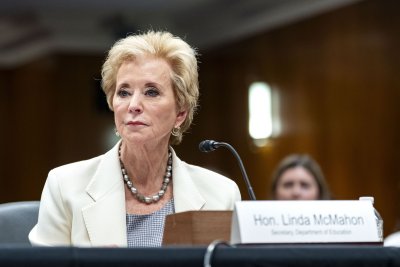
Oct. 17 (UPI) — The University of Pennsylvania and the University of Southern California have rejected the Trump administration’s offer of priority access to federal funds in exchange for adopting government-mandated reforms.
With the rejections of Penn and USC on Thursday, four of the nine universities the Department of Education asked to sign on to its 10-part “Compact for Academic Excellence in Higher Education” have so far declined.
In a letter addressed to the Penn community on Thursday, the school’s president, Larry Jameson, informed the Department of Education that Penn “respectfully” declined to sign the compact.
“At Penn, we are committed to merit-based achievement and accountability. The long-standing partnerships between American higher education and the federal government has greatly benefited society and our nation. Shared goals and investment in talent and ideas will turn possibility into progress,” Jameson said.
Beong-Soo Kim, interim president at USC, also told his community Thursday that they had informed the Department of Education that they wouldn’t be signing the compact.
Included in the statement was the letter he sent to Education Secretary Linda McMahon, which said that while they will not sign on to the compact, it raises issues “worthy of a broader national conversation to which USC would be eager to contribute its insights and expertise.”
“We are concerned that even though the compact would be voluntary, tying research benefits to it would, over time, undermine the same values of free inquiry and academic excellence that the compact seeks to promote.”
Since returning to the White House in January, President Donald Trump has targeted dozens of universities, particularly so-called elite institutions, with executive orders, lawsuits, reallocations of resources and threats over a range of allegations, from anti-Semitism to the adoption of diversity, equity and inclusion policies.
Critics have accused Trump of trying to coerce schools under threat of stringent punishments — from losing their accreditation to paying hefty fines sometimes in excess of $1 billion — to adopt his far-right policies.
The compact announced Oct. 1 demands reforms to hiring practices and student grading and includes a pledge to prohibit transgender women from using women’s changing rooms.
It also requires the creation of a “vibrant marketplace of ideas,” a tuition freeze for five years and a cap on international enrollment, among other reforms.
After Penn announced its decision, the state’s governor, Josh Shapiro, commended the school for maintaining its independence “in the face of the Trump administration’s attempts to dictate what private colleges and universities teach and use the long arm of the federal government to censor ideas with which they disagree.”
“The Trump administration’s dangerous demands would limit freedom of speech, the freedom to learn and the freedom to engage in constructive debate and dialogue on campuses across the country,” he said in a statement.
“I am in full support of the university’s decision and appreciate the leadership and courage demonstrated by President Jameson and Board Chair [Ramanan] Raghavendran.”
Brown University refused to sign the compact on Wednesday and MIT late last week.
